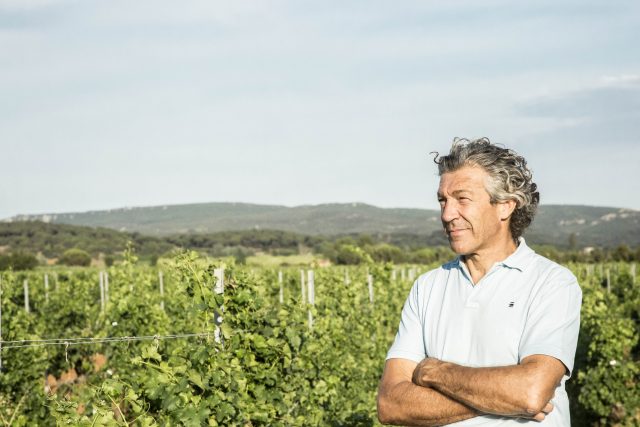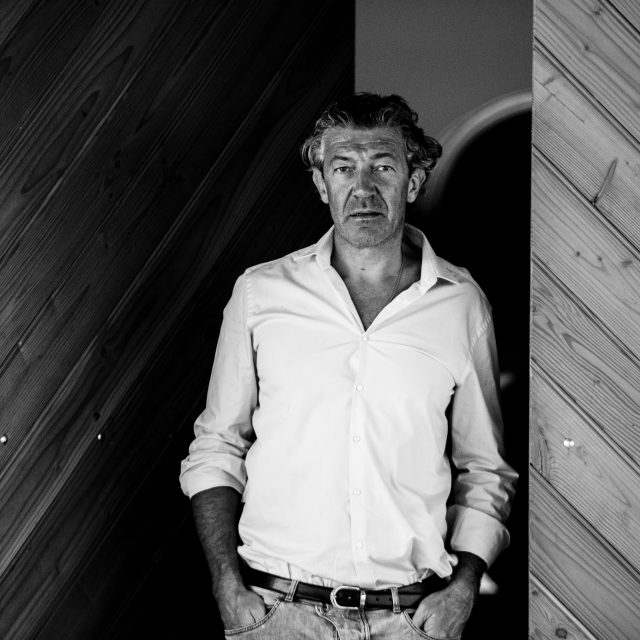This website uses cookies so that we can provide you with the best user experience possible. Cookie information is stored in your browser and performs functions such as recognising you when you return to our website and helping our team to understand which sections of the website you find most interesting and useful.
Master Winemakers Top 100: Gérard Bertrand
Gérard Bertrand, founder and winemaker of his eponymous group, features as one of our top 100 winemakers and winner of the Best Rosé award. He speaks to db about the importance of biodiversity, lessons from his father and the perfect glass at the end of a long day.

Before taking over the family business after his father’s death, Gérard Bertrand played rugby union for France and RC Narbonne. One of the most influential producers in Languedoc-Roussillon, he is a major advocate of biodynamics.
Bertrand received Master medals for Clos du Temple 2021, Clos du Temple 2022 and Château La Sauvageonne Rosé 2022 at the Global Rosé Masters 2023.
Describe your winemaking approach in no more than three words.
Nature. Balance. Message.
What’s your favourite part of the job?
The alchemy of blending, an art to which I love to devote myself. It’s the final winemaker’s touch that composes with the elements. Blending is essential because it structures and shapes the wine. I’ve always been fascinated by this exercise.
Which aspect of the job keeps you awake at night?
Happily, these days I sleep quite well. Indeed, when I took over the family estate after my father passed away, several challenging years followed during which I slept little, preoccupied with the 1,001 details from vineyard to bottle and the wish to perpetuate my father’s passion and vision with as much precision as possible. But now I am confident and I move forward in serenity with my teams.
What’s your go-to drink at the end of a long day?
After a long day, I would probably go for a glass of our Orange Gold. This orange wine is a wine of character, a perfect companion for aperitifs and cheese platters shared between friends and family. It’s also very nice as a cocktail.
What’s the best piece of advice you’ve ever been given?
I would quote my father. When I was 10, doing my first harvest with him at Château de Villemajou, he told me: “You know, Gérard, you are lucky because when you are 50 years old, you will already have 40 years of experience.” At that age, I didn’t get the depth of his words. He was so right; I now understand that he was showing me that being a winemaker requires a long-term vision, a clear awareness that the impact of what we do today must accompany the vine for decades. This year, I harvested my 48th vintage.
What was your greatest winemaking mistake?
I do work better now than when I had less experience, and I hope I will continue improving myself. But I’m not sure I would make alternative big decisions. And frankly, looking back to where we stood 20 years ago and where we stand now, I do not regret any decision we made. I’ve always preferred looking to the future instead of the past.
What’s the most important winemaking lesson you’ve learned so far?
My friend Jean-Claude Berrouet gave me a lot of advice regarding blending. He taught me how important it was to do a session with several people and personalities. And I quickly realised that what each of us contributed was complementary. When making wine, you strive to achieve balance and harmony, but also to bring out each wine’s personality. It is important to blend with people you trust, people with whom you have complicity and a strong affinity, on the same wavelength.
Which figure outside the world of wine inspires you?
I am very inspired by Nelson Mandela’s life story and his efforts to promote equality and unity. One quote from him that particularly drives me is: “We are all meant to shine, not just a few. As we let our own light shine, we unconsciously give others permission to do the same. If we free ourselves from our own fear, our presence automatically liberates others.”
Where would your fantasy vineyard be?
I have always been deeply connected to my native region, the South of France. That’s why all 17 of my châteaux and estates are located in Occitania. However, if I were to thrive in another vineyard, I think it would be in Greece. I remain very attached to the Mediterranean, its art of living, its terroirs, and its grape varieties, so I think I would go to Greece.
If you weren’t a winemaker, what would you be doing and why?
I would still have dedicated my life to preserving biodiversity in one way or another.
What’s the most memorable food match you’ve had with one of your wines?
At the occasion of our harvest festival this year, we had the opportunity to do a very special wine tasting experience with the Clos du Temple rosé and caviar from Sturia.

What role does sustainability have to play in a Master-winning wine?
We must work hand-in-hand with nature. We are a part of the whole. Being a winemaker is a responsibility towards the environment, the terroirs, consumers and future generations. Wine is a multidimensional beverage, but it is not necessary for survival. That’s why I consider my role as a winemaker essential. Our conduct must be exemplary, from the vineyard to the glass, and I see it as my responsibility to encourage our entire ecosystem to embrace a new paradigm. All this is why I made the decision to adopt biodynamics 20 years ago and I systematically convert each newly-acquired plot to biodynamics and greener practices.
Which type of wine do you drink most regularly?
I drink all kinds of wines for different occasions. This is what I particularly love about my region. The terroirs of the south of France allow us to produce powerful and balanced red wines, rosé wines with remarkable freshness and acidity, harmonious and complex white wines, lively and fresh sparkling wines, and even intense and spicy natural sweet wines.
Your home is on fire: which bottle do you save?
If I had to choose only one wine, it would be La Forge. La Forge was my father’s favourite plot in Château de Villemajou. I decided to vinify this plot separately to produce one wine, unlike any other, which gives me an incomparable emotion.

